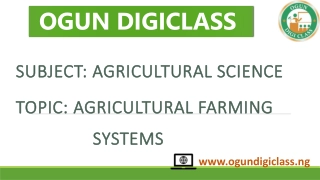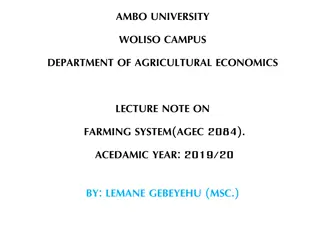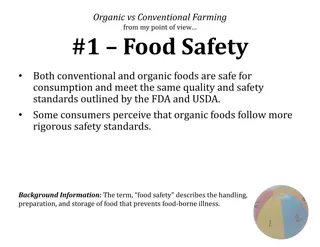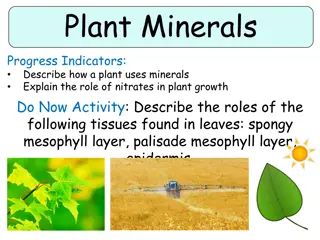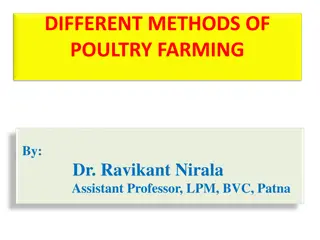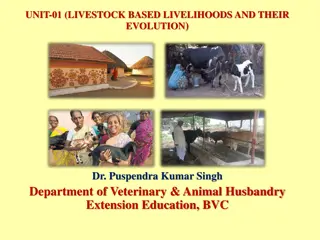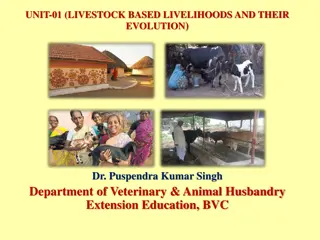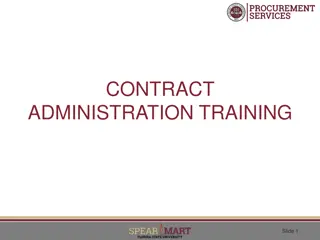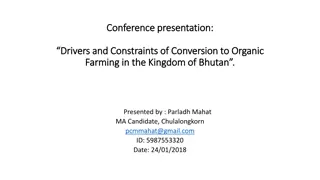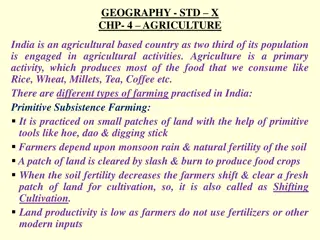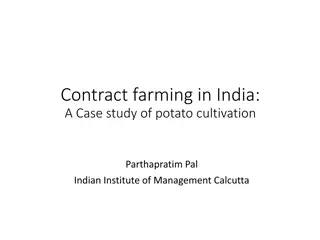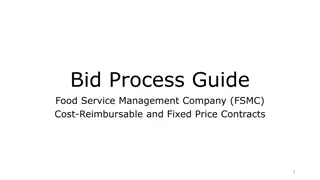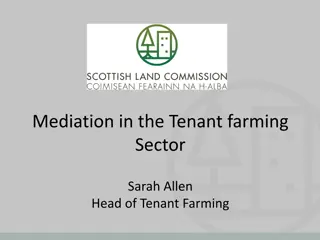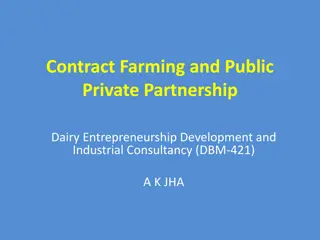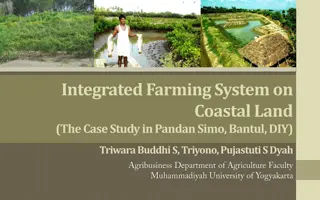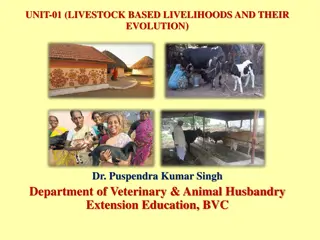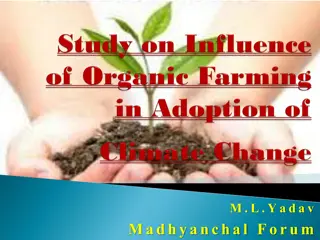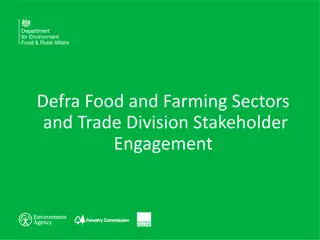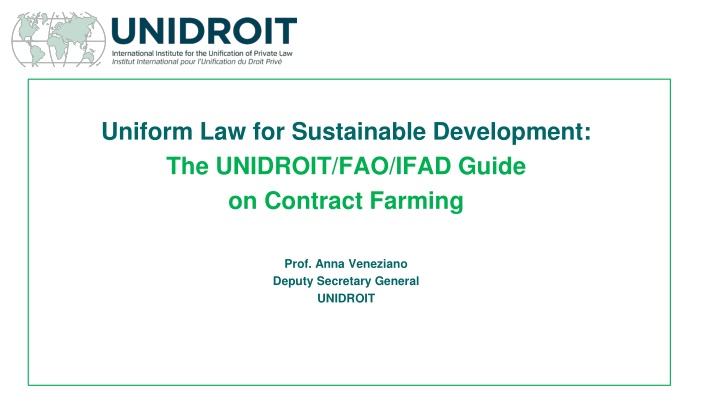
UNIDROIT Guide on Sustainable Agriculture Development
Explore the UNIDROIT/FAO/IFAD legal guides and projects focused on sustainable agricultural development, including topics like contract farming, financing, and enterprise structure. Learn about the key role of contracts in creating balanced investment relationships within the regulatory framework.
Download Presentation

Please find below an Image/Link to download the presentation.
The content on the website is provided AS IS for your information and personal use only. It may not be sold, licensed, or shared on other websites without obtaining consent from the author. If you encounter any issues during the download, it is possible that the publisher has removed the file from their server.
You are allowed to download the files provided on this website for personal or commercial use, subject to the condition that they are used lawfully. All files are the property of their respective owners.
The content on the website is provided AS IS for your information and personal use only. It may not be sold, licensed, or shared on other websites without obtaining consent from the author.
E N D
Presentation Transcript
Uniform Law for Sustainable Development: The UNIDROIT/FAO/IFAD Guide on Contract Farming Prof. Anna Veneziano Deputy Secretary General UNIDROIT
UNIDROIT/FAO/IFAD LEGAL GUIDE ON CONTRACT FARMING Published in 2015 by UNIDROIT in cooperation with the two UN Rome-based specialised organisations: Food and Agricultural Organization (FAO) International Fund for Agricultural Development (IFAD) Text available on the UNIDROIT website in several languages: English, French, Spanish, Portuguese, Chinese https://www.unidroit.org/english/guides/2015contractfarming/cf- guide-2015-e.pdf
UNIDROITs work in the field of agriculture The idea for UNIDROIT to work in the area of agricultural development originated in 2009 with a memorandum presented to the Governing Council on Private Law and Economic and Social Development An important step was the Colloquium in Rome in 2011 on Promoting Investment in Agricultural Production: Private Law Aspects , where the synergy with the multilateral organisations working for agricultural development was explored (FAO; IFAD) Potential areas of work were defined: Contract farming - 2015 UNIDROIT/FAO/IFAD Legal Guide - LGCF Financing of agriculture - 2020 UNIDROIT/IFAD Legal Guide on Agricultural Land Investment Contracts ALIC - 2019 MAC Protocol to the Cape Town Convention - Ongoing project with UNCITRAL on a Model Law on Warehouse Receipt Legal structure of enterprises - Ongoing UNIDROIT/FAO/IFAD project Title to land
UNIDROITs work in the field of agriculture (2) LEGAL STRUCTURE OF AGRICULTURAL ACCESS TO FINANCE IN CONTRACT LAW AND ENTERPRISES AGRICULTURE AGRICULTURE (WP 2020-2022) UNCITRAL-UNIDROIT MODEL LAW ON WAREHOUSE RECEIPTS (ongoing) UNIDROIT/IFAD UNIDROIT/FAO/IFAD MAC PROTOCOL TO THE CAPE LEGAL GUIDE ON LEGAL GUIDE ON CONTRACT TOWN CONVENTION (2019) AGRICULTURAL LAND FARMING (2015) INVESTMENT CONTRACTS (ALIC) (2021)
UNIDROITs work in the field of agriculture (2) KEY ROLE OF THE CONTRACT to create a balanced investment relationship Interplay with the REGULATORY FRAMEWORK
Role of the contract and legal guidance documents General Principles elaborated at Legislation at international level national or CFS Principles for Responsible Investment in regional level Agriculture and Food Systems (CFS-RAI GUIDANCE Principles) Model DOCUMENTS UN Global Compact contracts, Voluntary Guidelines on CONTAINING A the Responsible standard MORE SPECIFIC Governance of Tenure of terms Land, Fisheries and (PRIVATE) LAW Forests in the Context of FRAMEWORK National Food Security (VGGT)
CONTRACT FARMING AS A RISK MANAGEMENT TOOL IN AGRICULTURAL VALUE CHAINS Contract farming as an intermediate form of coordination and connection between production and (international) markets: Based on an agreement prior to production: The buyer agrees with the farmer on the commodity (type, quantity, quality attributes), on place and time of delivery, often on production methods The buyer agrees to sell for a price (or price formula) set in advance, which takes the provided inputs and services into account) The buyer generally provides support for the production: material inputs, financing, technical assistance, monitoring of production
POTENTIAL BENEFITS OF CONTRACT FARMING? KEY POTENTIAL ADVANTAGES FOR CONTRACTORS: guaranteed access and regularity of supply of the commodity conformity to product quality and safety standards and traceability control facilitated access to land without land acquisition KEY POTENTIAL ADVANTAGES FOR FARMERS: a secured output market and stabilized income, mitigated production risks facilitated access to inputs, services, technology, credit and financing, enhanced production methods empowerment with agronomical skills no interference with land right issues
POTENTIAL BENEFITS OF CONTRACT FARMING? KEY POTENTIAL GLOBAL ECONOMIC AND SOCIAL ADVANTAGES: Food security objectives: early planning and better alignment between production and demand enhance the stabilization of markets and limit price volatility contribute to higher quality of produce Economic development: private sector s input (investment capacity, advanced technology, and facilitated access to export markets) Empowerment of farmers and support transition from a subsistence production to a commercial/ market-oriented production Economic and social development of rural areas
POTENTIAL RISKS FOR PARTIES? POTENTIAL RISKS FOR FARMERS: asymmetrical relationship in access to information, exposure to risks, bargaining power small farmers in disadvantage against commercially oriented farmers potentially high dependency on the buyer regarding access to inputs, credit etc. and risk of growing indebtedness. risks of unfair conditions and fraudulent practices by buyer, with difficult or unavailable redress mechanisms shift to monoculture entails risks regarding access to subsistence crops, loss of biodiversity, environmental threats POTENTIAL RISKS FOR CONTRACTORS: viability of the investment Potentially high transaction costs Risk on farmers non compliance with quality requirement, proper use of inputs, delivery of the agreed commodity (no side-selling)
UNIDROIT/FAO/IFAD LEGAL GUIDE: NATURE, PURPOSE, CONTENT Promotion of good practices: The aim is to reach a fair and enforceable agreement in application of basic principles: Fair and loyal dealings Transparency Cooperation between parties Effective and proportionate remedies Easy and fair settlement of problems arising during performance and in final dispute resolution with a view to keeping the value of the relationship
CONTRACT FARMING IN THE UNIDROIT-FAO-IFAD LEGAL GUIDE Bilateral contract farming relationship between: a producer (farmer producing agricultural commodities, either as an individual or through a cooperative or other associative venture, including indigenous communities), and a contractor (a commercial purchaser, investor, exporter and/or food processor, typically an agribusiness company, but also non- commercial such a public or religious entity) Third parties are usually involved: depending on the commodity, country, etc. (credit institutions, certification bodies, NGO s, governmental bodies (also within a Public Private Partnership PPP))
ORIGINAL FEATURES OF AGRICULTURAL PRODUCTION UNDER CONTRACT - Remarkably uniform wherever used, but: - impact of domestic laws and practices as well as the different economic environment may introduce important variations - Generally, stable, long-term relationship with frequent interaction between parties - Importance of providing risk-sharing tools and alternatives - Generally, not an international contract, but: - Impact of international/regional standards - Impact of contracts concluded along the value chain
UNIDROIT/FAO/IFAD LEGAL GUIDE: NATURE, PURPOSE, CONTENT Description of contractual phases and issues to be considered: The Guide follows the development of the contract from the negotiation phase to remedies and dispute resolution: Parties, formation and form; Obligations of the parties; Excuses for non- performance; Remedies for breach; Duration, Renewal, and Termination; Dispute Resolution The Guide highlights the interplay with the national or international private law and/or regulatory framework A general approach, to be adapted to domestic legal, economic and social environments
A SPECIFIC EXAMPLE: PRICE DETERMINATION MECHANISMS Chapter 3 of the Legal Guide Price as a central element in the sustainability of the relationship for both parties The issues discussed in the Legal Guide include: May the parties freely agree on the price and at what time? Is it an essential term of the contract? Situations where price terms may be invalidated under the applicable law Illustration of advantages and risks of common price determination mechanisms: fixed prices flexible prices with scales according to quality, performance or yield (bonus and penalties) Examples of good practices: transparency regarding price mechanisms Cooperation mutual profitability considering mechanisms for price adjustment for long term contracts
HOW CAN A GUIDANCE INSTRUMENT BE SUCCESSFUL? NEED TO INVOLVE ALL ADDRESSEES/STAKEHOLDERS IN THE DRAFTING AND SUBSEQUENT IMPLEMENTATION Contract parties and their representatives Early involvement in Working Group and consultation events International organisations engaged (also) in field work Field work needed! Legislators defining public policy in contract farming and related areas Specificities of domestic legal, social and economic environment to be taken into account! National cooperation agencies


